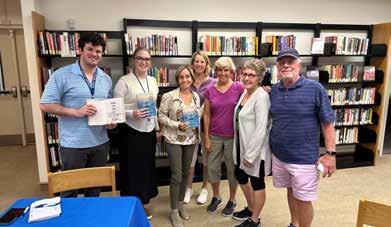
3 minute read
"People Love Dead Jews": The Conversation Continues
September 2023
By Erin Mackie, JFGC Intern
What comes to mind when you hear the phrase “People Love Dead Jews?” Chances are, your initial reaction mirrors that of many others when reading the provocative title of Dara Horn’s book by the same name. However, as you delve into its pages, you gradually grasp the profound essence of the book — shedding light on how society has normalized the act of learning about ‘dead Jews’ rather than celebrating their lives. This compelling theme emerged during my attendance at Wine and Wisdom, a collaborative discussion on July 13, presented by the Jewish Federation of Greater Charlotte (JFGC) as part of its Outshine Hate initiative and the Stan Greenspon Holocaust and Social Justice Education Center, where members of the Charlotte Jewish community, educators, and professionals convened to explore the impact of this thought-provoking book.
The conversation began last spring when Dara Horn’s book was featured at the JFGC’s Center for Jewish Education Jewish Book Festival earlier this year. It was evident then that this was an ongoing conversation the community wished to explore. Everyone participating at Wine and Wisdom had a good understanding of Horn’s message, which became evident during the engaging dialogue. The discussion left me with two powerful insights.
First and foremost, Judaism bestows a radiant light upon the world — a guiding force of wisdom and compassion. Jackie Fishman, the daughter of a Holocaust survivor, stressed that Judaism should not be seen solely through the lens of victimhood. Instead, it should be seen through the lens of a deeper appreciation for its enduring contributions to the world. Secondly, the heart of the issue concerning the normalized comfort around the topic of deceased Jews lies within our education system.
Horn’s book touched many educators, as well. Douglas Greene, currently the JFGC government relations and public affairs associate, has 11 years of experience in Holocuast education in the public schools. He says, “This book really challenged everything that I had based almost two decades of my pedagogical experiences on and forced my mindset to evolve into realizing that to address antisemitism we need to evolve the practices in which curriculum is informed and taught so that we can help stem the ripple effect of antisemitism.” Regrettably, most schools like ones Greene used to teach at allocate little time to Jewish education, and when they do, it revolves around the negative episodes of Jewish history rather than emphasizing the diverse and rich aspects. To transform the public perception of Judaism, a vital shift in the curriculum is imperative. It is evident that the prevailing societal attitudes can be reshaped by enlightening our educational approach. Instead of perpetuating a skewed focus on tragedies and hardships, we must embrace the opportunity to illuminate the richness of Jewish culture, heritage, and contributions to humanity. By dedicating more time and resources to comprehensive Jewish education, we allow future generations to appreciate the beauty and essence of this tradition, fostering a more inclusive and empathetic society. The power of knowledge and understanding can dissolve misconceptions and biases.
Let us embark on a journey to redefine the narrative surrounding Judaism and bring forth a more profound appreciation for its enduring light in the world. Together, through a renewed commitment to education, we can pave the way for a brighter, more enlightened future, where respect and admiration for diverse cultures and histories prevail.










